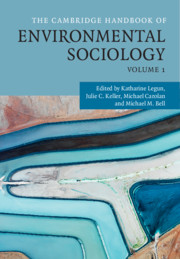Book contents
- The Cambridge Handbook of Environmental Sociology Volume 1
- The Cambridge Handbook of Environmental Sociology
- Copyright page
- Contents
- Figures
- Tables
- Contributors
- Foreword
- Introduction
- Part I Theory in Environmental Sociology
- 1 Classical Theory and Environmental Sociology: Toward Deeper and Stronger Roots
- 2 Globalizing Environmental Sociology
- 3 An Embodied Materialist Sociology
- 4 The Environmental Sociology of the Good: Nature, Faith, and the Bourgeois Transition
- 5 Microsociological Perspectives in Environmental Sociology
- Part II The Economy and Environmental Sociology
- Part III Culture and Environmental Sociology
- Part IV Politics, Power, State
- Part V Social Justice
- Index
- References
1 - Classical Theory and Environmental Sociology: Toward Deeper and Stronger Roots
from Part I - Theory in Environmental Sociology
Published online by Cambridge University Press: 05 November 2020
- The Cambridge Handbook of Environmental Sociology Volume 1
- The Cambridge Handbook of Environmental Sociology
- Copyright page
- Contents
- Figures
- Tables
- Contributors
- Foreword
- Introduction
- Part I Theory in Environmental Sociology
- 1 Classical Theory and Environmental Sociology: Toward Deeper and Stronger Roots
- 2 Globalizing Environmental Sociology
- 3 An Embodied Materialist Sociology
- 4 The Environmental Sociology of the Good: Nature, Faith, and the Bourgeois Transition
- 5 Microsociological Perspectives in Environmental Sociology
- Part II The Economy and Environmental Sociology
- Part III Culture and Environmental Sociology
- Part IV Politics, Power, State
- Part V Social Justice
- Index
- References
Summary
Chapter Two examines the origins of the canon of classical sociological theory and how this canon entered environmental sociology in the field’s early history. The analysis highlights the centrality of colonialism and imperialism, as well as mid-twentieth century liberalism and geopolitics – along with their ideological underpinnings – in shaping both ecological and social thought, as well as the discipline of sociology, with consequences for the later emergence of environmental sociology. The chapter closes by pointing to opportunities for further recovery of early critical perspectives lost, due in part to the process of canon formation and practices of social exclusion and academic marginalization, at great cost to the development of socio-ecological thought and action.
Keywords
- Type
- Chapter
- Information
- The Cambridge Handbook of Environmental Sociology , pp. 11 - 29Publisher: Cambridge University PressPrint publication year: 2020
References
- 2
- Cited by

